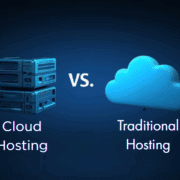Benefits of Application Development in Cloud Computing for Businesses
Imagine launching your application in weeks instead of months, scaling effortlessly as your business demand grows, and reducing development costs by up to 50%. This isn’t just an imagination anymore, but a reality leading to new possibilities.
All thanks to application development in cloud computing.
Cloud computing is transforming the modern application landscape, making app development faster, smarter, and more efficient for businesses.
A Statista report mentions that the global cloud-based app development market will reach a valuation of $168.6 billion by the end of 2025, growing at a CAGR of 4.8%. This growth signifies that businesses are increasingly embracing cloud computing for application development to remain agile and competitive.
And there’s a significant reason behind this—the numerous benefits that cloud-based application development offers over other development practices.
So in this blog, we will be dedicatedly focusing on application development for cloud computing and the advantages it offers to businesses. Moreover, we’ll take a look at some of the best practices and the cost of cloud-based app development.
What is Application Development in Cloud Computing?
Application development in cloud computing refers to the process of designing, building, and deploying applications that leverage the capabilities of cloud infrastructure. Instead of relying on local servers or data centers, these applications are hosted in cloud environments such as AWS, Google Cloud, or Microsoft Azure.
Cloud app development brings a paradigm shift from traditional application development models by enabling flexibility, scalability, and cost efficiency. Businesses no longer need to worry about the upfront costs of purchasing hardware or managing physical infrastructure, as cloud solutions provide everything needed.
Benefits of Application Development in Cloud Computing
Application development for cloud computing proves beneficial to every enterprise and business since a majority of critical processes, such as data storage and processing, are taken care of by remote servers. Along with that, cloud application development offers a range of undeniable advantages for businesses.
Here are some of the most notable benefits of developing cloud applications for businesses in today’s cloud-first landscape:
Scalability and Flexibility
Using cloud based development services allows organizations to easily scale their resources up and down without major infrastructure changes. Based on the sudden rise or drop in traffic and demand, businesses can simply add or limit cloud storage and computing capabilities as needed for their applications.
Cost Efficiency
Traditional software development often involves significant capital investment in infrastructure, licenses, and maintenance. In contrast, cloud-based application development follows a pay-as-you-go model. This significantly reduces operational costs, especially for businesses that want high performance at low cost.
Enhanced Collaboration
Cloud based software development fosters real-time collaboration between different teams. Developers, testers, and designers can work simultaneously, accessing the same files and systems without lag or data inconsistency. Tools like GitHub and Bitbucket streamline workflows and make development seamless.
Faster Time-to-Market
With cloud application development, businesses can drastically reduce the time it takes from ideation to deployment of the application. Pre-configured environments, reusable code modules, and serverless architectures help teams release applications quickly while maintaining high quality and security standards.
Improved Security and Compliance
Application development in cloud computing leverages robust security measures like end-to-end data encryption, identity management, and automated compliance regulation, safeguarding applications from cybersecurity threats effectively. It also helps businesses ensure their applications meet stringent data privacy regulations.
Easy Maintenance and Updates
A significant benefit of application development in cloud environments is that it makes maintenance updates easier. System updates, patches, and performance monitoring are often handled automatically, reducing the burden on developers and businesses while ensuring their application remains up-to-date.
Continuous Integration and Delivery (CI/CD)
CI/CD pipelines are an integral part of developing cloud-based applications. They automate testing, integration, and deployment processes, resulting in fewer bugs, quicker feedback loops, and improved software quality. With cloud integration services, businesses can roll out new features rapidly without disrupting operations.
Disaster Recovery and Backup
Cloud platforms offer built-in disaster recovery solutions and data backup mechanisms. In the event of a system failure, data breach, or natural disaster, businesses can restore their applications quickly without significant data loss. This ensures business continuity and offers a seamless user experience.
Best Practices for Developing Cloud Applications
Getting the most out of application development for cloud computing requires a strategic approach, leveraging advanced techniques and the right practices. Adopting these practices ensures your application performs optimally under load, remains secure, and meets user needs efficiently.
Let’s break down some of the best practices for developing cloud applications, providing actionable insights for business:
Choose the Right Architecture
Analyze your options for cloud architecture and look for the most suitable one. Use cloud-native architectures such as microservices or serverless computing. These allow independent deployment of modules, improving scalability and maintainability.
Optimize for Performance
Performance is the most critical aspect of any application, and you must prioritize it during the entire development process. You can leverage the auto-scaling and load-balancing features of cloud platforms with cloud-based development services.
Automate Workflows
You can automate application development workflows in cloud computing by leveraging automation tools to manage deployments, integrations, and monitoring. This reduces human error and improves development efficiency.
Prioritize Security
Cloud-based applications demand robust security measures to secure your business data and your users’ sensitive information. Engage cloud consulting services to implement robust security protocols like access controls and data encryption.
Monitor and Analyze
Employ cloud analytics tools to monitor performance metrics, user behavior, and system health. This data-driven approach aids in continuous improvement for your application and helps you make informed decisions for the future.
Leverage Cloud Based Development Services
For businesses that find cloud-based application development challenging, an ideal solution is to partner with professional cloud based development services. These services ensure the success of your application development project.
How Much Does Application Development in Cloud Computing Cost?
The cost of application development for cloud computing varies depending on factors like app complexity, chosen cloud provider, storage needs, and development time. But the factor that matters the most is ultimately your business requirements and the objective you want to achieve with your application.
The best part about cloud-based application development is that you don’t have to deal with the cost that goes into server setup, complex hardware, and data storage solutions, saving your initial costs significantly. It means that emerging businesses or those with limited budgets can also leverage cloud-based app development.
Concluding Thoughts
Today’s fast-paced digital landscape demands speed, scalability, and smart solutions, and application development in cloud computing excels in meeting all three demands. From cost savings and improved security to faster deployment and seamless collaboration, the benefits are too significant to ignore.
Whether you are a small startup building its first application or an enterprise planning to upgrade its legacy systems, application development using cloud computing capabilities offers a future-ready path to innovation. And with the support of professional cloud integration services, the journey becomes even more profitable.




